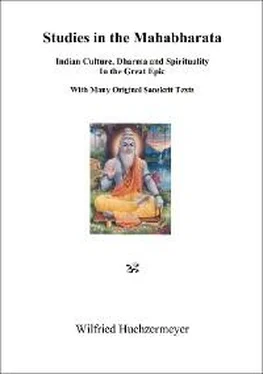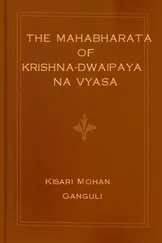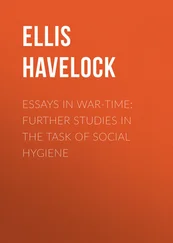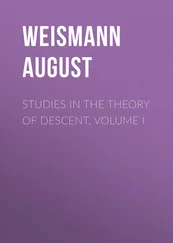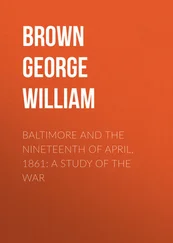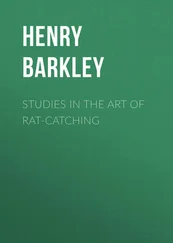We may compare this with Kṛṣṇa’s words to Arjuna at the moment of his great crisis:
Again, with a view to your own dharma as well, you should not waver; for, there is nothing higher for a kṣatriya than righteous war.
But if you do not fight this righteous war, you will forfeit your own dharma and honour and incur sin.
Your enemies will slander you in various ways, reviling your strength. What could be worse than that?39
It is to be observed that in both these cases the argument is not developing on a highest spiritual, but rather on a moral human level. The appeal is to the sense of human honour, uprightness. From a higher spiritual view point it should matter little what the enemies of a disciple think about him, whether it be good or bad. But in the given situation an appeal of this kind may be more effective and is therefore chosen here by Kṛṣṇa and Arjuna respectively.
In the present scene Kṛṣṇa finally advances a new argument to change Yudhiṣṭhira’s mind. He proposes a personal encounter with Jarāsaṁdha avoiding his superior army. If the king is killed, his forces would be dispirited. And if those forces should attack the aggressors, the latter would “attain heaven” due to their efforts to protect their kinsmen.40 This reminds us again of the Bhagavadgītā’s pronouncement: “Slain you will attain heaven; victorious you will enjoy the earth.”41
After some initial hesitation and resistance Yudhiṣṭhira has been convinced now of the need of attacking Jarāsaṁdha and agrees to the proposal. He recognizes Kṛṣṇa as the “protector of the Pāṇḍavas”, in whom they seek shelter. “All that you say, Govinda, is correct…”42
The Execution of Kṛṣṇa’s Plans
Kṛṣṇa’s plan of executing Jarāsaṁdha is carried out by Bhīma who kills the mighty king in a terrible wrestling duel. Kṛṣṇa is present as a non-combatant giving effective psychological support and tactical advice to the Pāṇḍava. This support is actually giving Bhīma the edge over his equal opponent who is finally crushed on the ground. His people do not offer any further resistance.
The 86 kings are released and urged to attend the great unction of Yudhiṣṭhira. His brothers conquer for him all the surrounding countries so that conditions are ready now for the Royal Consecration. In a gesture of gratitude Yudhiṣṭhira attributes all his success to Kṛṣṇa who has master-minded the strategic move which gave him his new status as unchallenged emperor.
Because of you, Kṛṣṇa, the whole earth is under my sway now and by your grace, Vārṣṇeya, I have obtained great wealth. Now I wish to employ all this properly for the best among the Brāhmins and for the sacrificial fire.43
The final act of Kṛṣṇa’s glorification as guru of all beings and the Pāṇḍavas in particular occurs in a chapter called The Taking of the Guest Gift. At the beginning of the gathering of the kings that have been invited for Yudhiṣṭhira’s coronation, Bhīṣma asks Yudhiṣṭhira to offer a guest gift to the most deserving visitor. He points out to him that Kṛṣṇa is by far the most important guest, full of glory, strength and prowess. The whole assembly is brightened by him “as a sunless place is by the sun and a windless one by the wind”.44
Śiśupāla’s Intervention
At this moment Śiśupāla, king of the Cedis, son of Vasudevas sister Śrutaśravā, intervenes angrily and refuses to accept Bhīṣma’s suggestion. In a highly polemic speech he insults Bhīṣma, Kṛṣṇa and the Pāṇḍavas, advancing some comprehensible arguments for denying Kṛṣṇa the honour of the special guest. If the elders of the assembly were to be honoured, Kṛṣṇa’s father Vasudeva would be the right choice. If the best ally of the Pāṇḍavas were to be honoured, Drupada might be the obvious choice. Or if a great teacher, an eminent priest were to be shown respect, Droṇa or Vyāsa should be first considered.
Śiśupāla’s language gets more and more coloured by hatred towards Kṛṣṇa whom he blames relentlessly for accepting the honour of the guest gift. In his typical way Yudhiṣṭhira tries to calm down Śiśupāla with courteous words. But then Bhīṣma speaks, making Yudhiṣṭhira aware that their choice of Kṛṣṇa does not need this kind of justification. Bhīṣma claims it to be a simple fact that Kṛṣṇa is the greatest personality present. Nobody in the assembly, he says, could compare with his glory. He adds that “the whole world is founded on Kṛṣṇa. Therefore we honour him and no one else, even in the presence of elders.”45
In the following passage Bhīṣma continues praising Kṛṣṇa who is lauded not only as a great teacher but also the transcendent ruler of the universe:
Kṛṣṇa alone is the origin and the dissolution of the worlds… He is the unmanifest prakṛti and the eternal doer… This Śiśupāla is a fool who does not know that Kṛṣṇa exists everywhere for ever; therefore he speaks like this.46
Next Sahadeva challenges all kings present to speak out if anyone does not want him to honour Kṛṣṇa. Nobody objects, but a group of irate kings gathers round Śiśupāla who then starts a frontal attack on Bhīṣma. He points out a number of alleged sins of the latter, specifically his abduction of Ambā47 who had already given her heart to Śālva and had become very miserable due to his action.
Bhīṣma retorts by giving some background knowledge on Śiśupāla, he informs the assembly how Kṛṣṇa gave a boon to his paternal aunt that he would forgive her son a hundred insults. It is for this very reason, says Bhīṣma, that Śiśupāla could act as he did in the present scene; in fact, “it was the decision of Kṛṣṇa himself, the Lord of the world.”48
Thus, the whole incident of Śiśupāla’s challenge is given a new interpretation now. Nobody can really challenge Kṛṣṇa, since everything is contained in him and part of his game. The rebellious king is nothing but “a particle of the glory of Hari” who wants to recover it.49 But Śiśupāla, undaunted by this mystical interpretation, continues insulting Bhīṣma, the Pāṇḍavas and Kṛṣṇa. The latter waits patiently until Śiśupāla has completed a hundred insults and then cuts off his head with the discus.
A miracle follows upon this final act of the drama: a great radiance rises forth from the killed king of the Cedis and enters Kṛṣṇa. Then there is a strong rain from a cloudless sky, lightning strikes and the earth trembles as all the kings in the assembly look on with great amazement.50
So the great Sacrifice ends on a somewhat dramatic note, but it has been successfully accomplished, after Yudhiṣṭhira’s last potential contender has been eliminated by Kṛṣṇa. He soon leaves for Dvārakā admonishing Yudhiṣṭhira to protect well his subjects.
Nārada had met him in his abode in heaven. Mbhr. 2.11.65Mbhr. 2.12.24-25, 28Mbhr. 2.12.38-40Mbhr. 2.14.9Mbhr. 2.15.5Mbhr. 2.15.9, 14-16Bhagavadgītā, 2-31, 33, 36Mbhr. 2.16.9Bhagavadgītä 2.37Mbhr. 2.18.10Mbhr. 2.30.18-19Mbhr. 2.33.28-29Mbhr. 2.35.10-11Mbhr. 2.35.26The eldest daughter of the king of Kāśī. Bhīṣma abducted her along with her two sisters for marriage with Vicitravīrya.Mbhr. 2.41.1Mbhr. 2.41.3Mbhr. 2.42.22-25
4.
Psychological, Philosophical and Legal Aspects of the Dice Game
“Please tell this in detail, Brāhmin, because this was the root of the destruction of the world, best of the twice-born.”51
The dice game takes us into one of the most dramatic scenes in the Mahābhārata. It raises a number of intricate questions which deserve an in-depth study and elaborate analysis. We come across here some noble aspects of Indian culture, but at the same time also its very contradiction. We meet individuals in extreme situations of the most acute inner trial, and find even the wisest of the wise perplexed by a set of circumstances which is bewildering by its complexity, frustrating by its entanglement and fatal by its sheer force.
Читать дальше
